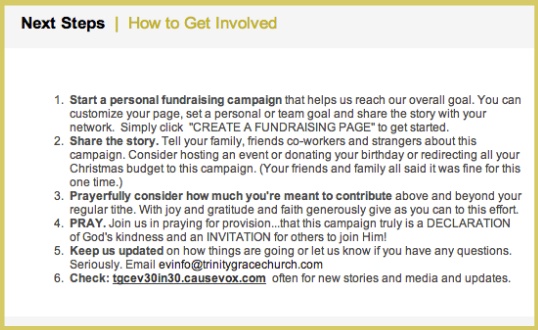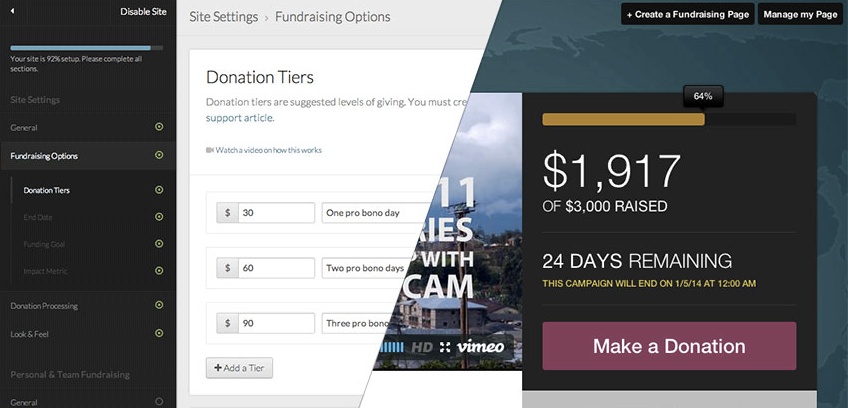I confess that I wasn’t at all interested in men’s college basketball until I went to college with a storied basketball program. I love me some March Madness, even when my alma mater doesn’t make it to the NCAA tournament (this year) or exits early (last year). The team changes every year, with players graduating or entering the NBA draft, but the coach remains the same.
Suppose your fundraising campaign is like March Madness; you’re the coach and your supporters who are fundraising for you (hereafter “personal fundraisers”) are your players. And behind successful players are good coaches.
The foundation of coaching your personal fundraisers will be communication. Here are five ways to guide them to success:
Give your fundraisers a roadmap
Before the campaign launches, layout the timeline, the purpose, and the targets for the campaign for your fundraisers. This allows them to anticipate and plan ahead; the advance notice is helpful for those who are especially prone to initiate and innovate.
For example, you might send an email a few weeks prior to the start date informing and inviting them; something like:
“Hello!
In a couple months, 10 girls in our children’s home are about to start school but there’s not enough funds to cover all of their tuition fees. So we’re going to run a crowdfunding campaign that will kick off in two weeks and will continue for another four weeks. We need to raise $10,000 to send them to school…”
Show your fundraisers the game plan
Once you’ve invited them in to see what’s happening, you’ll have to show how it’s going to happen. Explain the strategy and steps in executing the campaign and their role in making the campaign goals into reality.
Trinity Grace Church East Village ran a 30-day campaign to raise $30,000. In their weekly email newsletter, they spelled out how the congregation could get involved:
Give your fundraisers the tools
Here’s where the basketball analogy might not hold up quite as well. In basketball, the team and coach are going to watch footage of their opponents so they can come up with strategic plays; during practices, teams run drills and scrimmage; and in the off-season, they’ll continue their physical training and conditioning.
But with crowdfunding, there are no drills (at least, not that I know of); there is, however, plenty of gear that your personal fundraisers will need: content and platform.
The content: your organization’s story, the fundraiser’s story, and the intersection of the two. The platform: the campaign page, and personal fundraiser’s page.
Your fundraisers might need the most guidance and encouragement when it comes to setting up the platform. With CauseVox, you can pre-fill your personal fundraisers’ pages with content that they can tailor, and content that’s standard throughout all pages related to the campaign (e.g., a video).
As the campaign continues, you should provide your fundraisers with content they can share with their network, like prewritten posts they can share via Facebook and Twitter that include a link to the main campaign page. Something along the lines of:
“10 days left to help me send 10 girls to school! Click here to join me: [URL]”
* If giving them a Tweet, make sure that the URL’s been shortened so it fits within the 140 character limit.
You may want to create graphics and/or photos they can share via Instagram or Pinterest, too.
Check-in regularly with your fundraisers
Throughout the course of the campaign, check in with your personal fundraisers. Like the way coaches take time outs, yell directions from the sidelines, and huddle up with their players during halftime.
Send an email to all your supporters midway through with encouragement
Reach out directly to personal fundraisers who may not be raising much relative to the others; offer a couple of tips and let them know they can turn to you for any additional pointers.
Highlight & affirm personal fundraisers who are on target via social media.
Thank your fundraisers
Finally, when your campaign wraps up, show your appreciation for all who participated. Gratitude will boost confidence in your top fundraisers and will offer hope for those who fell short of their personal goals for next time.
Crowdfunding like any skill takes practice and guidance! With some coaching on your end, you’ll get great performances from your players, I mean, personal fundraisers.







